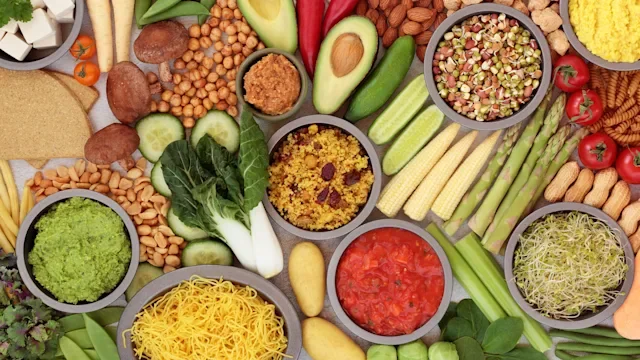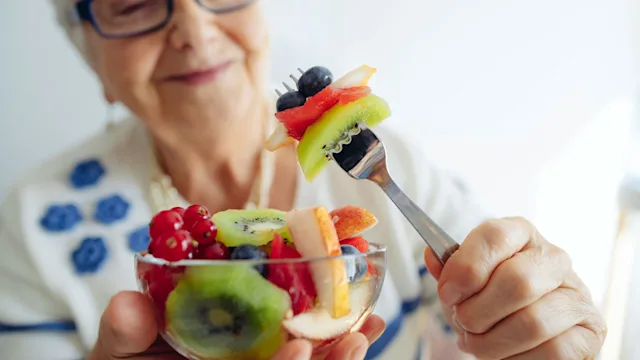Key takeaways:
L-glutathione is a powerful, natural antioxidant. It helps protect cells from damage and supports the immune system.
L-glutathione is a protein produced by cells throughout the body. Eating foods high in L-glutathione can help raise glutathione levels in the body.
Foods high in glutathione include fruits, vegetables, and lean meats.
Antioxidants are powerful substances that protect your body from damage.
L-glutathione (or just glutathione) is an antioxidant made up of three amino acids: cysteine, glutamate, and glycine. L-glutathione prevents cell damage, removes toxins, and supports the immune system. Your body naturally makes L-glutathione. But some people also turn to glutathione supplements to try and give their natural levels a boost.
Supplements aren’t your only option though. Certain foods are naturally high in glutathione. And eating these foods can prompt your body to make more of its own glutathione. Plus, most foods that are high in glutathione also contain other important nutrients.
Let’s look at how you can use your diet to boost your glutathione levels.
What foods are high in glutathione?
Many fruits and vegetables are high in glutathione. Lean meats can also be a good source of glutathione too.
Here are the top foods for increasing glutathione and how to add them to your diet.
1. Asparagus
This tasty green vegetable has lots of health benefits. Besides being high in glutathione, asparagus is a good source of fiber, folate, and vitamin C.
One study examined concentrations of glutathione in asparagus when using different cooking methods. Researchers found that glutathione increased when asparagus spears were prepared in the following ways:
Baked for short periods
Microwaved
Steamed
Why are antioxidants good for you? Antioxidants protect your cells from damage that can cause disease. And it’s not difficult to add them to your diet.
Looking for more antioxidant rich foods? Here are nine foods that are rich in lycopene.
Milk thistle and glutathione: Milk thistle can help boost glutathione levels naturally. Three people share with GoodRx what it’s like to take milk thistle.
But no matter how you prepare asparagus, it provides an excellent source of glutathione.
2. Avocado
In addition to glutathione, avocados contain numerous vitamins, minerals, and healthy fats. Numerous studies have shown that avocado promotes cardiovascular health, among other potential health benefits.
Avocado is a great source of glutathione. So, put it on toast, add it to a salad, or make other recipes with this nutrient-rich food.
3. Grapefruit
Grapefruit is high in glutathione. And this citrus fruit is also packed with vitamin C, beta carotenes, and another powerful antioxidant, lycopene. It also has plant chemicals called flavonoids that help fight heart disease and stroke.
Peeling your grapefruit like an orange and eating the white membrane along with the fruit wedges also provides pectin, a great source of fiber.
You can enjoy many grapefruit recipes as part of your diet. If you take certain medications, talk to your primary care provider before eating grapefruit.
4. Lean meats
Lean meats like pork, veal, and chicken are great sources of both protein and glutathione. One study found that grass-fed animals had higher concentrations of glutathione than grain-fed ones.
Instead of frying your meat, try grilling or roasting it. These methods are better for your heart health.
5. Winter squash
Including squash in your diet has a wide range of health benefits. And it’s rich in glutathione.
Winter squash includes familiar favorites like butternut, acorn, and spaghetti. But other, less familiar winter squash can help add variety to your meal planning.
You can roast it, stuff it, or mash it. No matter how you prepare squash, it’s an excellent source of fiber, vitamins, and minerals — as well as glutathione.
6. Watermelon
Watermelon helps keep you hydrated with its 92% water composition. It’s also an excellent source of glutathione, lycopene, and vitamins A and C.
Add watermelon to a smoothie, chop it up as part of a fruit salad, or eat it straight from the rind. However you prepare watermelon, you’ll get many health benefits from this fruit.
Can you have too much glutathione?
No, you can’t eat too much glutathione. Your gut breaks down glutathione from the food you eat into its amino acid building blocks. Your body uses these building blocks to make all the glutathione it needs. Any leftovers get removed from your body by your liver and kidneys.
How can you increase glutathione levels naturally?
Besides increasing glutathione in your diet, are there other ways to increase glutathione levels naturally? Let’s look at the evidence behind other habits to boost glutathione.
Exercise
Exercise has many health benefits. And researchers have found that a regular combination of weight training and aerobic exercise helps increase glutathione levels better than either alone.
Experts recommend getting 150 minutes of moderate physical activity each week, along with some strength training.
Sleep
Sleep helps maintain both your physical and mental health. It may also affect glutathione levels.
Researchers have found that people with insomnia had lower levels of glutathione than people without insomnia. Studies in animals found that animals with sleep deprivation had lower glutathione levels in their brains.
Try keeping a regular sleep schedule to boost your glutathione levels.
Frequently asked questions
There’s no recommended daily intake for glutathione. But most people make enough glutathione to maintain healthy body functions. By eating a balanced diet, getting enough sleep, and exercise, your body can make all the glutathione it requires.
In rare cases, people have a genetic condition that prevents them from making enough glutathione. People with certain medical conditions or people with a very restricted diet might be at risk for having lower glutathione levels.
Most people won’t experience symptoms from low glutathione levels. It can be hard to tell if you need more glutathione in your diet. Talk with your healthcare team if you’re concerned about your glutathione levels.
There’s no recommended daily intake for glutathione. But most people make enough glutathione to maintain healthy body functions. By eating a balanced diet, getting enough sleep, and exercise, your body can make all the glutathione it requires.
In rare cases, people have a genetic condition that prevents them from making enough glutathione. People with certain medical conditions or people with a very restricted diet might be at risk for having lower glutathione levels.
Most people won’t experience symptoms from low glutathione levels. It can be hard to tell if you need more glutathione in your diet. Talk with your healthcare team if you’re concerned about your glutathione levels.
The bottom line
L-glutathione is a powerful antioxidant, found in many fruits and vegetables like watermelon and asparagus. Eating foods that are naturally high in glutathione may boost your body’s glutathione production. Staying active and getting enough sleep can also help naturally boost your glutathione levels.

Why trust our experts?


References
Alosi, M. C., et al. (1988). The regulation of gelation of phloem exudate from Cucurbita fruit by dilution, glutathione, and glutathione reductase. Plant Physiology.
American Heart Association. (2024). Making the healthier cut.
American Heart Association News. (2020). Before grabbing a grapefruit, understand its power. American Heart Association.
Buonocore, D., et al. (2015). Bioavailability study of an innovative orobuccal formulation of glutathione. Oxidative Medicine and Cellular Longevity.
Centers for Disease Control and Prevention. (2024). What you can do to meet physical activity recommendations.
Daley, C. A., et al. (2010). A review of fatty acid profiles and antioxidant content in grass-fed and grain-fed beef. Nutrition Journal.
Dreher, M. L., et al. (2013). Hass avocado composition and potential health effects. Critical Reviews in Food Science and Nutrition.
Drinkwater, J. M., et al. (2014). Effects of cooking on rutin and glutathione concentrations and antioxidant activity of green asparagus (Asparagus officinalis) spears. Journal of Functional Foods.
Drugs.com. (2024). What is glutathione used for?
Elokda, A. S., et al. (2007). Effects of exercise training on the glutathione antioxidant system. European Journal of Preventive Cardiology.
Gulec, M., et al. (2012). Oxidative stress in patients with primary insomnia. Progress in Neuro-Psychopharmacology and Biological Psychiatry.
Guoyao, W., et al. (2023). Glutathione metabolism and its implications for health. The Journal of Nutrition.
Jones, D. P., et al. (2009). Glutathione in foods listed in the National Cancer Institute's Health Habits and History Food Frequency Questionnaire. Nutrition and Cancer.
Khan, U. M., et al. (2021). Lycopene: Food sources, biological activities, and human health benefits. Oxidative Medicine and Cellular Longevity.
Liu, S., et al. (2005). Glutathione: Its implications for animal health, meat quality, and health benefits of consumers. Australian Journal of Agricultural Research.
Mathangi, D. C., et al. (2012). Effect of REM sleep deprivation on the antioxidant status in the brain of Wistar rats. Annals of Neurosciences.
Merschel, M. (2021). Watermelon is a summertime staple. But what's hidden behind the sweetness? American Heart Association.
Minich D.M., et al. (2019). A review of dietary (phyto)nutrients for glutathione support. Nutrients.
National Health Service. (2024). Meat in your diet.
National Organization for Rare Disorders. (2024). Glutathione synthetase deficiency.
NatureClaim. (2024). Asparagus nutrition.
Olas, B. (2024). A review of the pro-health activity of Asparagus officinalis L. and its components. Foods.
PubChem. (2025). Glutathione. National Library of Medicine.
The Nutrition Source. (n.d.). Winter squash. Harvard T. H. Chan School of Public Health.














